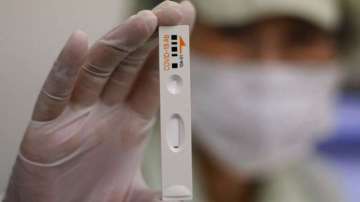People who test COVID-19 positive by the rapid antigen method will be examined by a medical officer at the testing site to assess the severity of illness, according to a Standard Operating Procedure (SOP) issued by the Delhi Health Department on Monday night. It also said the assessment made by the medical officer shall “effectively constitute as the assessment made at the COVID-care centre".
The SOP also states that in the case of those who have tested positive in RT-PCR tests, a team of district surveillance officers will contact these patients on telephone to assess the category of illness.
For cases that need to be shifted to hospitals or COVID healthcare centres, the transfer will be made by ambulances, it said.
For effective contact tracing, a dedicated team of callers will record details of the people who were in contact with COVID-19 positive cases since the onset of symptoms.
The guidelines come after an order on home isolation by Lieutenant Governor Anil Baijal was modified.
In view of the surge in the coronavirus cases, the Lt Governor had last week ordered mandatory institutional quarantine.
The move was opposed by the AAP government.
However, according to the order, all individuals who are positive will be referred to COVID care centres for assessment of clinical conditions, severity of illness and presence of co-morbidities.
Simultaneously, physical assessment will also be done whether adequate facilities for home isolation like minimum of two rooms and a separate toilet exists so that family members and neighbours are protected, and a cluster of cases does not develop in that locality, the order said.
“All cases who test positive by the rapid antigen test will be examined by the medical officer on duty at the testing site to assess the severity of the illness that is pre-symptomatic, asymptomatic/ moderate or severe,” the SOP stated.
“The assessment made by the medical officer on site shall effectively constitute as assessment made at the COVID-care centre,” it stated As per guidelines, pre-symptomatic and asymptomatic patients, unless they have co-morbid conditions, can be placed under home isolation if they have residence of two rooms with a separate toilet for the patient.
The patient will also be provided with a pulse oximeter by the medical officer at the testing centre. The use of the oximeter and other protocols for home isolation will be explained by the medical officer.
“Mild or pre-symptomatic cases who do not have the facility of a separate room or a toilet will be transferred to a COVID care centre. All cases of moderate, severe illness will be transferred to the hospital.
“All cases of mild symptoms with co-morbid conditions will be shifted to COVID care centres or hospitals,” the SOP said.
It added that patients in home isolation will be discharged from treatment as per the discharge policy of the Union Health Ministry which mandates discharge from home isolation after 10 days.
In case of the RT-PCR test, a team of district surveillance officers will contact patients on telephone to assess the category of illness, it said
“For cases who are mild/ pre-symptomatic the patient will be shifted to COVID-care centre to assess eligibility for home isolation. If as per the assessment of the home isolation sent by the DSO, if the patient has a residence of two rooms with a separate toilet for the patient, he will be sent back home to continue home isolation,” the SOP said.
The patient will be provided a contact number for any consultation required by him or her along with the details of the CATS ambulance number for transfer to hospital in case symptoms develop.
In case his residence is not found fit for home isolation, the patient will be admitted to COVID care centre for isolation as per the Ministry of Health and Family Welfare guidelines.
Latest India News
